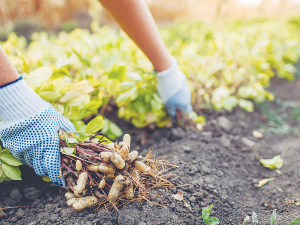NZ Catchment Groups Thrive with ‘Source to Sea’ Approach
The most successful catchment groups in NZ are those that have 'a source to sea' approach.
 MPI believes establishing a peanut industry in Northland would help diversify its regional economy and create employment.
MPI believes establishing a peanut industry in Northland would help diversify its regional economy and create employment.
That old saying about peanuts and monkeys may be turned on its head in Northland, where a government-backed project has proven that the crop can be grown successfully in the region.
An initial feasibility study claimed that the industry could be worth millions to the region, with New Zealand companies importing tonnes of peanuts every year.
Now, additional government funding aims to take the project towards the possible commercialistion of growing peanuts in the north.
MPI is contributing nearly $700,000 to a new peanut growing trial via its Sustainable Food and Fibre Futures fund (SFF Futures). Meanwhile, an additional $300,000 in cash and in-kind support is coming from Northland Inc, Picot Productions, Landcare Research, Plant & Food Research and local Northland landowners.
"The findings of a six month feasibility study supported through SFF Futures late last year were encouraging," says Steve Penno, MPI director of investment programmes. "This new project will build upon the initial findings to determine whether its financially viable to plant, harvet, and process peanuts at scale."
Northland Inc is taking the lead in the new project, which will run for 2 years.
"The peanuts will be grown at seven sites in Northland, across both the Kaipara and Far North districts, during the two-year life of the project," says Vaughan Cooper, general manager Investment & Infrastructure at Northland Inc.
"We hope for another successful outcome that will provide conclusive evidence that peanuts can be grown and harvested on a larger scale. This will give investors and Northland landowners, growers and farmers the confidence they need to diversify into peanut growing."
Cooper says while it's clear that returns are possible from peanuts, they also need to factor in the commercial equipment required for harvesting and drying.
"We'll be doing extensive economic modelling to determine whether the costs are worthwhile when producing peanuts at scale."
Penno says establishing a peanut industry in Northland would help diversify its regional economy, create employment both on-and-off farm, and support investment opportunities.
"It will also provide another crop rotation option for local landowners," he says. "Plus, we could eventually bring a 100% New Zealand grown and manufactured peanut butter to market. That's an exciting prospect."
Voting has started for the renewal of DairyNZ's milksolids levy.
The most successful catchment groups in NZ are those that have 'a source to sea' approach.
Associate Agriculture Minister and Manawatu dairy farmer Andrew Hoggard says the free trade agreement (FTA) negotiated with India is not a bad deal and his party, Act, will support it when it goes before Parliament.
Newly released data from Environment Canterbury (ECan) Farm Environment Plan (FEP) audits are showing a dramatic lift in environmental performance across the region.
A solid recovery of global dairy prices this year makes a $9.50/kgMS milk price almost a shoo-in for this season.
As New Zealand marks the United Nations’ International Year of the Woman Farmer 2026 (IYWF 2026), industry leaders are challenging the misconception that women only support farming.

OPINION: Here w go: the election date is set for November 7 and the politicians are out of the gate…
OPINION: ECan data was released a few days ago showing Canterbury farmers have made “giant strides on environmental performance”.